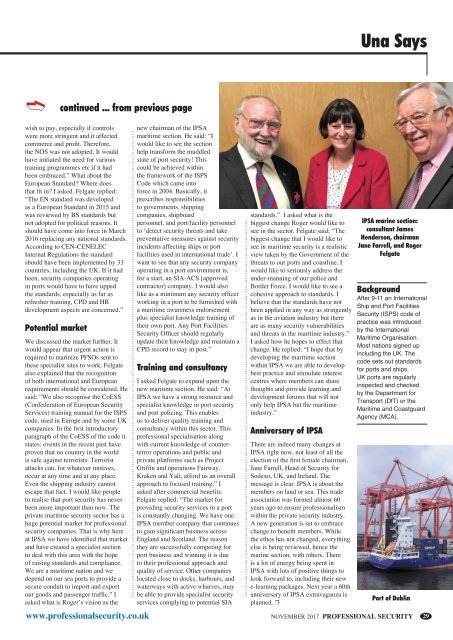27-11draft
You also want an ePaper? Increase the reach of your titles
YUMPU automatically turns print PDFs into web optimized ePapers that Google loves.
Una Says<br />
➬<br />
wish to pay, especially if controls<br />
were more stringent and it affected<br />
commerce and profit. Therefore,<br />
the NOS was not adopted. It would<br />
have initiated the need for various<br />
training programmes etc if it had<br />
been embraced.” What about the<br />
European Standard? Where does<br />
that fit in? I asked. Felgate replied:<br />
“The EN standard was developed<br />
as a European Standard in 2015 and<br />
was reviewed by BS standards but<br />
not adopted for political reasons. It<br />
should have come into force in March<br />
2016 replacing any national standards.<br />
According to CEN-CENELEC<br />
Internal Regulations the standard<br />
should have been implemented by 33<br />
countries, including the UK. If it had<br />
been, security companies operating<br />
in ports would have to have upped<br />
the standards, especially as far as<br />
refresher training, CPD and HR<br />
development aspects are concerned.”<br />
Potential market<br />
continued ... from previous page<br />
We discussed the market further. It<br />
would appear that urgent action is<br />
required to marinize PFSOs sent to<br />
these specialist sites to work. Felgate<br />
also explained that the recognition<br />
of both international and European<br />
requirements should be considered. He<br />
said: “We also recognise the CoESS<br />
(Confederation of European Security<br />
Services) training manual for the ISPS<br />
code, used in Europe and by some UK<br />
companies. In the first introductory<br />
paragraph of the CoESS of the code it<br />
states: events in the recent past have<br />
proven that no country in the world<br />
is safe against terrorists. Terrorist<br />
attacks can, for whatever motives,<br />
occur at any time and at any place.<br />
Even the shipping industry cannot<br />
escape that fact. I would like people<br />
to realise that port security has never<br />
been more important than now. The<br />
private maritime security sector has a<br />
huge potential market for professional<br />
security companies. That is why here<br />
at IPSA we have identified that market<br />
and have created a specialist section<br />
to deal with this area with the hope<br />
of raising standards and compliance.<br />
We are a maritime nation and we<br />
depend on our sea ports to provide a<br />
secure conduit to import and export<br />
our goods and passenger traffic.” I<br />
asked what is Roger’s vision as the<br />
www.professionalsecurity.co.uk<br />
new chairman of the IPSA<br />
maritime section. He said: “I<br />
would like to see the section<br />
help transform the muddled<br />
state of port security! This<br />
could be achieved within<br />
the framework of the ISPS<br />
Code which came into<br />
force in 2004. Basically, it<br />
prescribes responsibilities<br />
to governments, shipping<br />
companies, shipboard<br />
personnel, and port/facility personnel<br />
to ‘detect security threats and take<br />
preventative measures against security<br />
incidents affecting ships or port<br />
facilities used in international trade’. I<br />
want to see that any security company<br />
operating in a port environment is,<br />
for a start, an SIA-ACS [approved<br />
contractor] company. I would also<br />
like as a minimum any security officer<br />
working in a port to be furnished with<br />
a maritime awareness endorsement<br />
plus specialist knowledge training of<br />
their own port. Any Port Facilities<br />
Security Officer should regularly<br />
update their knowledge and maintain a<br />
CPD record to stay in post.”<br />
Training and consultancy<br />
I asked Felgate to expand upon the<br />
new maritime section. He said: “At<br />
IPSA we have a strong resource and<br />
specialist knowledge in port security<br />
and port policing. This enables<br />
us to deliver quality training and<br />
consultancy within this sector. This<br />
professional specialisation along<br />
with current knowledge of counterterror<br />
operations and public and<br />
private platforms such as Project<br />
Griffin and operations Fairway,<br />
Kraken and Yali, afford us an overall<br />
approach to focused training.” I<br />
asked after commercial benefits.<br />
Felgate replied: “The market for<br />
providing security services in a port<br />
is constantly changing. We have one<br />
IPSA member company that continues<br />
to gain significant business across<br />
England and Scotland. The reason<br />
they are successfully competing for<br />
port business and winning it is due<br />
to their professional approach and<br />
quality of service. Other companies<br />
located close to docks, harbours, and<br />
waterways with active wharves, may<br />
be able to provide specialist security<br />
services complying to potential SIA<br />
standards.” I asked what is the<br />
biggest change Roger would like to<br />
see in the sector. Felgate said: “The<br />
biggest change that I would like to<br />
see in maritime security is a realistic<br />
view taken by the Government of the<br />
threats to our ports and coastline. I<br />
would like to seriously address the<br />
under-manning of our police and<br />
Border Force. I would like to see a<br />
cohesive approach to standards. I<br />
believe that the standards have not<br />
been applied in any way as stringently<br />
as in the aviation industry but there<br />
are as many security vulnerabilities<br />
and threats in the maritime industry.”<br />
I asked how he hopes to effect that<br />
change. He replied: “I hope that by<br />
developing the maritime section<br />
within IPSA we are able to develop<br />
best practice and stimulate interest<br />
centres where members can share<br />
thoughts and provide learning and<br />
development forums that will not<br />
only help IPSA but the maritime<br />
industry.”<br />
Anniversary of IPSA<br />
There are indeed many changes at<br />
IPSA right now, not least of all the<br />
election of the first female chairman,<br />
Jane Farrell, Head of Security for<br />
Sodexo, UK, and Ireland. The<br />
message is clear. IPSA is about the<br />
members on land or sea. This trade<br />
association was formed almost 60<br />
years ago to ensure professionalism<br />
within the private security industry.<br />
A new generation is set to embrace<br />
change to benefit members. While<br />
the ethos has not changed, everything<br />
else is being reviewed, hence the<br />
marine section, with others. There<br />
is a lot of energy being spent in<br />
IPSA with lots of positive things to<br />
look forward to, including their new<br />
e-learning packages. Next year a 60th<br />
anniversary of IPSA extravaganza is<br />
planned. p<br />
IPSA marine section:<br />
consultant James<br />
Henderson, chairman<br />
Jane Farrell, and Roger<br />
Felgate<br />
Background<br />
After 9-11 an International<br />
Ship and Port Facilities<br />
Security (ISPS) code of<br />
practice was introduced<br />
by the International<br />
Maritime Organisation.<br />
Most nations signed up<br />
including the UK. The<br />
code sets out standards<br />
for ports and ships.<br />
UK ports are regularly<br />
inspected and checked<br />
by the Department for<br />
Transport (DfT) or the<br />
Maritime and Coastguard<br />
Agency (MCA).<br />
Port of Dublin<br />
NOVEMBER 2017 PROFESSIONAL SECURITY<br />
29<br />
p28,9 Una <strong>27</strong>-11.indd 2 12/10/2017 11:22










